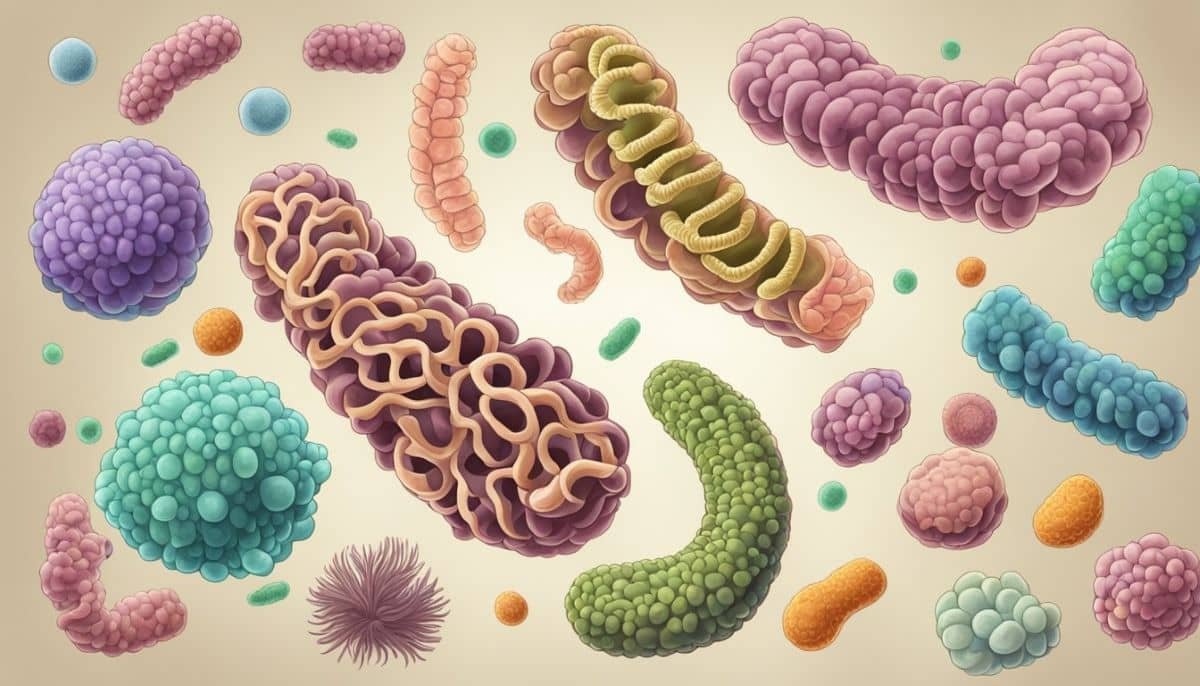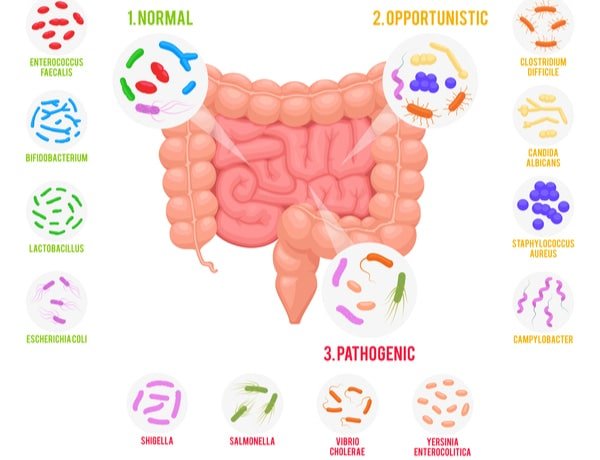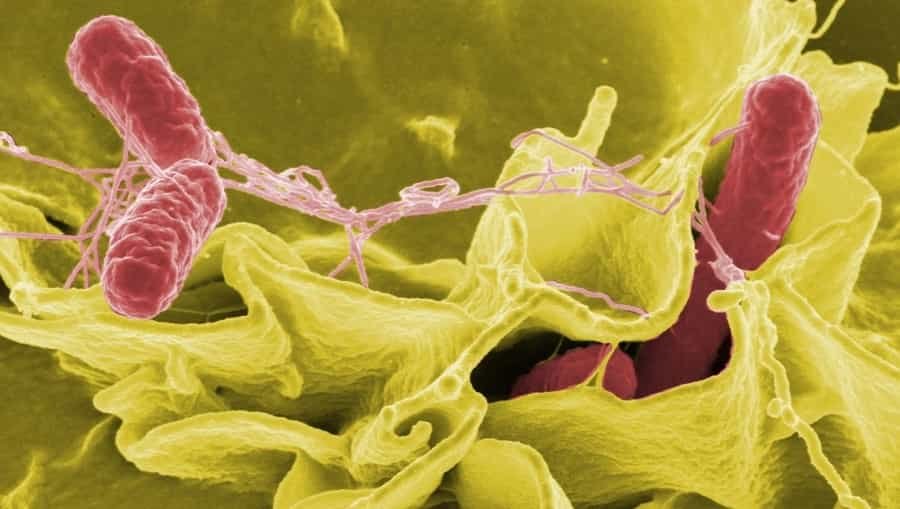What are the types of intestinal bacteria? A Quick Guide

If you’re interested in learning what are the types of intestinal bacteria, you’ve come to the right place. The human gut is home to trillions of microorganisms, including bacteria, fungi, and viruses. [1]
There are many different types of bacteria that live in your intestines, each with its own unique characteristics and functions. For example, one of the most common types of bacteria found in the human gut is Bacteroidetes.
These bacteria are known for their ability to break down complex sugars and other carbohydrates, which helps to facilitate the absorption of nutrients in the intestines.
Another important type of bacteria found in the human gut is Firmicutes. These bacteria are known for their ability to break down dietary fiber and other complex carbohydrates.
They also play a key role in the production of short-chain fatty acids, which are important for maintaining the health of the intestinal lining.
Other types of bacteria found in the human gut include Actinobacteria, Proteobacteria, and Verrucomicrobia, among others.
In this article, we’ll focus specifically on the different types of bacteria that live in your intestines and what each type does.
✅ Numbers in brackets throughout the article will direct you to credible research papers and scientific articles (all links open in a new window). I strongly recommend that you make use of these resources to delve deeper into the subjects discussed.
Understanding Intestinal Bacteria
Intestinal bacteria are microorganisms that reside in the gastrointestinal tract.
They play a crucial role in maintaining the health of the digestive system. There are many different types of intestinal bacteria, each with its own unique characteristics and functions.
Some of the most common intestinal bacteria include:
- Bacteroides. This type of bacteria is found in the large intestine and is responsible for breaking down complex carbohydrates and producing short-chain fatty acids.
- Lactobacillus. This type of bacteria is found in the small intestine and produces lactic acid. It helps to maintain the pH balance of the digestive system and supports the growth of other beneficial bacteria.
- Bifidobacterium. This type of bacteria is found in the large intestine and helps to break down complex carbohydrates and produce vitamins.
- Escherichia coli (E. coli). This type of bacteria is found in the large intestine and helps to break down food and produce vitamin K.
- Clostridium difficile (C. difficile). This type of bacteria is found in the large intestine and can cause diarrhea and other digestive problems if it overgrows.
- Enterococcus: Found in the small intestine and large intestine, they aid in digestion and nutrient absorption.
- Streptococcus: Residing in the mouth, throat, and intestines, they have various roles, including carbohydrate fermentation.
- Salmonella: These bacteria can be found in the large intestine and are known for causing food poisoning and gastrointestinal infections.
- Campylobacter: Found in the large intestine, they are associated with foodborne illnesses and can cause diarrhea and abdominal discomfort.
- Akkermansia muciniphila: Located in the mucus lining of the intestines, these bacteria play a role in mucin degradation and have potential health benefits.
- Ruminococcus: Residing in the large intestine, they are involved in breaking down complex carbohydrates.
- Prevotella: Found in the mouth and gastrointestinal tract, they play a role in carbohydrate metabolism and may impact gut health.
- Veillonella: These bacteria are commonly found in the oral cavity, and they contribute to the breakdown of lactate.
- Fusobacterium: Present in the mouth and gastrointestinal tract, they are involved in carbohydrate metabolism and can impact oral health.
- Parabacteroides: Residing in the intestines, these bacteria participate in the fermentation of complex carbohydrates.
- Roseburia: Found in the large intestine, Roseburia bacteria are known for their role in breaking down dietary fibers.
- Klebsiella: Present in the intestines, these bacteria can perform various metabolic functions and are associated with both beneficial and pathogenic strains.
- Enterobacter: These bacteria can be found in the gastrointestinal tract and play a role in nutrient metabolism.
- Fecalibacterium prausnitzii: Located in the colon, these bacteria contribute to the production of butyrate, a beneficial short-chain fatty acid.
It is important to maintain a healthy balance of intestinal bacteria in order to support optimal digestive health.
Factors such as diet, stress, and medication use can all affect the balance of intestinal bacteria. Probiotics and prebiotics can be used to support the growth of beneficial bacteria and maintain a healthy balance of intestinal flora.
Types of Intestinal Bacteria
According to Japanese pharmaceutical company, Otsuka Pharmaceutical, when it comes to intestinal bacteria, there are three main types:
- Good bacteria: These help maintain health and slow down aging. They assist with digestion, boost the immune system, and aid in nutrient absorption. Examples are bifidobacteria and lactic acid bacteria.
- Bad bacteria: These are harmful and can cause diseases and accelerate aging. Examples include Clostridium perfringens, Staphylococcus, and toxic E. coli. They have negative effects on the body.
- Opportunistic bacteria: They are usually harmless when you’re healthy but can cause issues in a weakened body. Examples are Bacteroidetes, non-toxic E. coli, and Streptococcus, which can harm the intestines under certain conditions.
| Type of Bacteria | Example | Action | Effect On Body |
|---|---|---|---|
| Good bacteria | Bifidobacteria, lactic acid bacteria | Vitamin synthesis, digestion and absorption assistance, infection prevention, immunity stimulation | Health maintenance |
| Bad bacteria | Staphylococcus, Clostridium perfringens, E.coli (toxic strain) | Intestinal putrefaction, production of bacterial toxin, production of carcinogenic substances, gas production | Trigger of disease |
| Opportunistic bacteria | Bacteroidetes, E.coli (nontoxic strain), Streptococcus | No trouble when healthy, but have adverse actions inside the intestines when the body is weak | – |
Friendly Bacteria
Friendly bacteria, also known as probiotics, are essential for maintaining a healthy gut. These bacteria help to break down food, produce vitamins and other important nutrients, and protect against harmful bacteria.
Some of the most common types of friendly bacteria found in the gut include:
- Lactobacillus
- Bifidobacterium
- Streptococcus
- Enterococcus
These bacteria can be found in many different foods, including yogurt, kefir, sauerkraut, and kimchi. You can also take probiotic supplements to help boost your levels of friendly bacteria.
Potentially Harmful Bacteria
Potentially harmful bacteria, also known as pathogenic bacteria, can cause a range of health problems if they are allowed to grow unchecked.
These bacteria can cause infections, inflammation, and other issues in the gut. Some of the most common types of potentially harmful bacteria found in the gut include:
- Escherichia coli (E. coli)
- Salmonella
- Shigella
- Campylobacter
These bacteria are often found in contaminated food or water, and can also be spread through contact with infected individuals.
To reduce your risk of exposure to potentially harmful bacteria, it’s important to practice good hygiene and food safety habits, such as washing your hands regularly, cooking meat thoroughly, and avoiding cross-contamination in the kitchen.
Read Also: 50 Worst Foods For Gut Health
Opportunistic bacteria
Opportunistic bacteria are a category of microorganisms that typically do not pose a threat to a healthy individual but can become problematic when the body’s defenses are weakened or compromised.
These bacteria may take advantage of vulnerable conditions to cause issues in the gut. Some examples of opportunistic bacteria found in the gut include:
- Bacteroidetes
- E. coli (nontoxic strain)
- Streptococcus
While opportunistic bacteria are generally harmless in healthy individuals, they can exhibit adverse actions within the intestines when the body’s immune system is weakened or when the natural balance of the gut is disrupted.
This disruption can result from factors such as illness, medication use, or changes in the gut environment.

The Role of Intestinal Bacteria in Digestion
Intestinal bacteria play a crucial role in the digestion of food. They help break down complex molecules that our bodies cannot digest on their own.
The large bowel flora makes an essential contribution to digestion, and the microbiota effectively functions as an organ within the colon.
Intestinal bacteria produce enzymes that break down carbohydrates, proteins, and fats. They also produce vitamins such as vitamin K, which is essential for blood clotting.
Without these bacteria, our bodies would not be able to extract all the nutrients from the food we eat.
One of the most important functions of intestinal bacteria is the breakdown of fiber. Fiber is a type of carbohydrate that our bodies cannot digest.
Certain types of bacteria in our gut can break down fiber and turn it into short-chain fatty acids (SCFAs). These SCFAs are an important source of energy for the cells that line our colon.
Another important function of intestinal bacteria is the regulation of our immune system. The bacteria in our gut help to train our immune system to recognize and fight off harmful pathogens. They also help to prevent harmful bacteria from colonizing our gut.
MassZymes 3.0 Enzymes
THE STRONGEST ENZYME FORMULA EVER: MassZymes (full review) is a full-spectrum enzyme formula with more protease than any other commercially available, with 5 different kinds of protease.
Plus, it contains all the other key enzymes you need for optimal digestion.

Impact of Diet on Intestinal Bacteria
Your diet plays a significant role in shaping the composition of your gut microbiome. The types of bacteria that thrive in your intestine depend on the food you consume.
A balanced diet that includes fruits, vegetables, grains, and probiotics can promote the growth of beneficial bacteria and improve your digestive health.
On the other hand, a diet high in fat, sugar, and processed foods can alter the balance of your gut microbiome and lead to the growth of harmful bacteria.
For instance, a Western-style diet that is high in fat and low in fiber is associated with a decrease in the abundance of bacteria that produce butyrate, a short-chain fatty acid that is essential for gut health. [2]
Moreover, studies have shown that dietary changes can have a rapid and significant impact on the composition of the gut microbiome.
For example, a study found that switching from a low-fat, plant-based diet to a high-fat, animal-based diet for just one day led to a decrease in the abundance of beneficial bacteria and an increase in the abundance of harmful bacteria. [3]
In addition to the type of food you consume, the timing and frequency of your meals can also affect your gut microbiome. Research suggests that intermittent fasting and time-restricted feeding can promote the growth of beneficial bacteria and improve gut health. [4]
The type of food you consume and the timing and frequency of your meals can have a significant impact on the composition of your gut microbiome. A balanced diet that includes a variety of fruits, vegetables, grains, and probiotics can promote the growth of beneficial bacteria and improve your digestive health.
Interactions Between Different Bacteria
Intestinal bacteria interact with each other in various ways.
Some bacteria can produce substances that inhibit the growth of other bacteria, while others can promote the growth of certain bacteria. These interactions can have a significant impact on the overall composition of the gut microbiota. [5]
One example of an interaction between different bacteria is the production of short-chain fatty acids (SCFAs). SCFAs are produced by some types of bacteria in the gut and can be used as a source of energy by other bacteria. This can lead to the growth of certain types of bacteria at the expense of others. [6]
Another example of an interaction between different bacteria is the production of bacteriocins. Bacteriocins are proteins produced by some bacteria that can kill or inhibit the growth of other bacteria. This can help to maintain a balance of different types of bacteria in the gut. [7]
Some bacteria can also form biofilms, which are communities of bacteria that adhere to each other and to the intestinal mucosa. Biofilms can provide protection from other bacteria and from the host immune system.
However, biofilms can also contribute to the formation of intestinal diseases. [8]
Overall, the interactions between different types of intestinal bacteria can have a significant impact on the composition and function of the gut microbiota. Understanding these interactions is important for developing strategies to promote a healthy gut microbiota.
How to Maintain a Healthy Bacterial Balance

Maintaining a healthy balance of intestinal bacteria is crucial for overall health. Here are some tips to help you maintain a healthy bacterial balance:
1. Eat a Balanced Diet
Eating a balanced diet that includes a variety of fruits, vegetables, whole grains, and lean proteins can help promote a healthy balance of intestinal bacteria. Avoid processed foods, sugary drinks, and excessive alcohol consumption, which can disrupt the balance of intestinal bacteria.
2. Take Probiotics
Probiotics are live bacteria and yeasts that are good for your health, especially your digestive system. They can be found in supplements and fermented foods like yogurt, kefir, and sauerkraut. Taking probiotics can help restore the balance of intestinal bacteria.
3. Avoid Antibiotics When Possible
Antibiotics are designed to kill harmful bacteria, but they can also kill beneficial bacteria in your gut. [9]
Avoid taking antibiotics unless they are absolutely necessary. If you must take antibiotics, talk to your doctor about taking a probiotic supplement to help restore the balance of intestinal bacteria.
Related: 20 Best Foods For Your Gut After Antibiotics
4. Manage Stress
Stress can disrupt the balance of intestinal bacteria. [10]
Finding ways to manage stress, such as meditation, exercise, or spending time outdoors, can help promote a healthy balance of intestinal bacteria.
5. Get Enough Sleep
Getting enough sleep is important for overall health, including maintaining a healthy balance of intestinal bacteria. Aim for 7-8 hours of sleep per night. [11]
Related: Why sleeping is important and how is keeping you healthier

Common Imbalances and Disorders
When the balance of intestinal bacteria is disrupted, it can lead to various disorders and health problems. Here are some of the most common imbalances and disorders associated with the intestinal microbiota:
Irritable Bowel Syndrome (IBS)
IBS is a common gastrointestinal disorder that affects many people worldwide. It is characterized by symptoms such as abdominal pain, bloating, and changes in bowel habits.
While the exact cause of IBS is unknown, research suggests that an imbalance in the gut microbiota may play a role. [12]
In fact, studies have shown that people with IBS have an altered composition of gut bacteria compared to healthy individuals. [12]
Inflammatory Bowel Disease (IBD)
IBD is a group of chronic inflammatory disorders that affect the digestive tract. The two main types of IBD are Crohn’s disease and ulcerative colitis.
Like IBS, the exact cause of IBD is unknown, but research suggests that an imbalance in the gut microbiota may contribute to the development of these disorders. In fact, studies have shown that people with IBD have a less diverse and less stable gut microbiota compared to healthy individuals. [13]
Small Intestinal Bacterial Overgrowth (SIBO)
SIBO is a condition characterized by an overgrowth of bacteria in the small intestine. This can lead to symptoms such as bloating, abdominal pain, and diarrhea.
Basically it is (again) an imbalance of the microorganisms in your gut that maintain healthy digestion. [14]
Antibiotic-Associated Diarrhea (AAD)
AAD is a common side effect of antibiotic use. Antibiotics can disrupt the balance of gut bacteria, leading to an overgrowth of harmful bacteria such as Clostridium difficile. This can cause diarrhea and other gastrointestinal symptoms. In fact, studies have shown that antibiotic use is the most common cause of AAD.

Research and Future Developments
As research into the human microbiome continues to expand, there is growing interest in the potential of intestinal bacteria to influence human health.
Recent studies have shown that the intestinal microbiome plays a critical role in many aspects of human health, including digestion, immune function, and even mental health.
One area of particular interest is the potential for intestinal bacteria to be used as a therapeutic target for a range of diseases. [15]
Researchers are currently exploring the use of probiotics, prebiotics, and other interventions to modulate the composition of the intestinal microbiome and improve health outcomes.
Another area of research is the development of new tools and techniques for studying the intestinal microbiome. Advances in next-generation sequencing and other molecular techniques have made it possible to study the composition and function of intestinal bacteria in unprecedented detail, providing new insights into the role of these microorganisms in human health and disease.
Finally, there is growing interest in the potential of personalized medicine approaches to target the intestinal microbiome. By analyzing an individual’s unique microbiome composition, researchers may be able to develop targeted interventions that are tailored to that individual’s specific needs and health status.
Overall, the study of intestinal bacteria is a rapidly evolving field with many exciting developments on the horizon. As research continues to expand, we can expect to gain a deeper understanding of the critical role that these microorganisms play in human health and disease, and to develop new interventions that leverage this knowledge to improve health outcomes.
Frequently Asked Questions
Bottom Line
What you need to keep from this article, is that our gut is a bustling hub of bacteria, both good and opportunistic.
These microscopic tenants play a crucial role in digestion, and our diet significantly impacts their diversity. They interact with each other to maintain a healthy balance.
However, imbalances can lead to disorders. So, it’s essential to understand these intestinal bacteria and how to keep them happy for our overall health.
Remember, a happy gut means a happy you!
Read More On Digestion and the Gut



